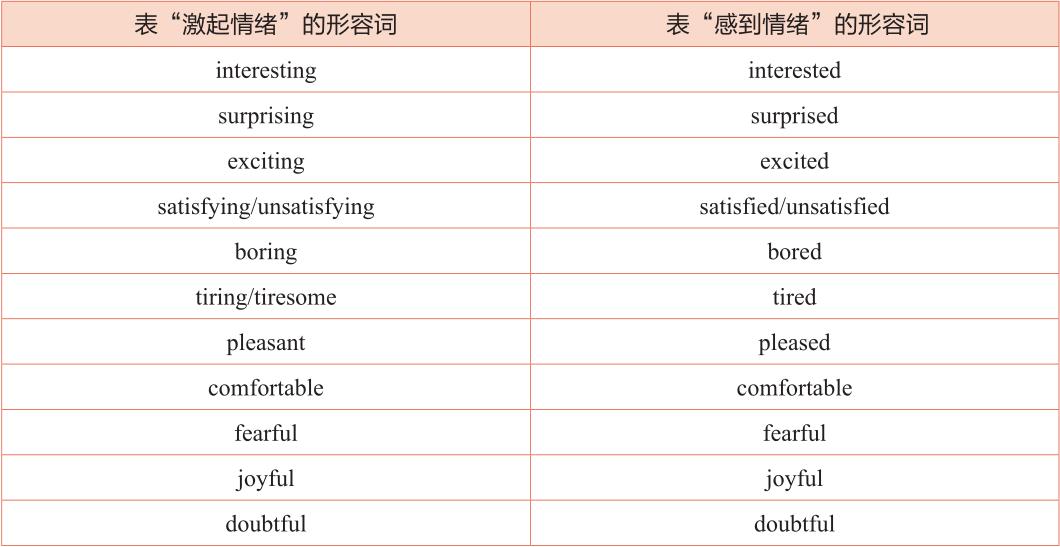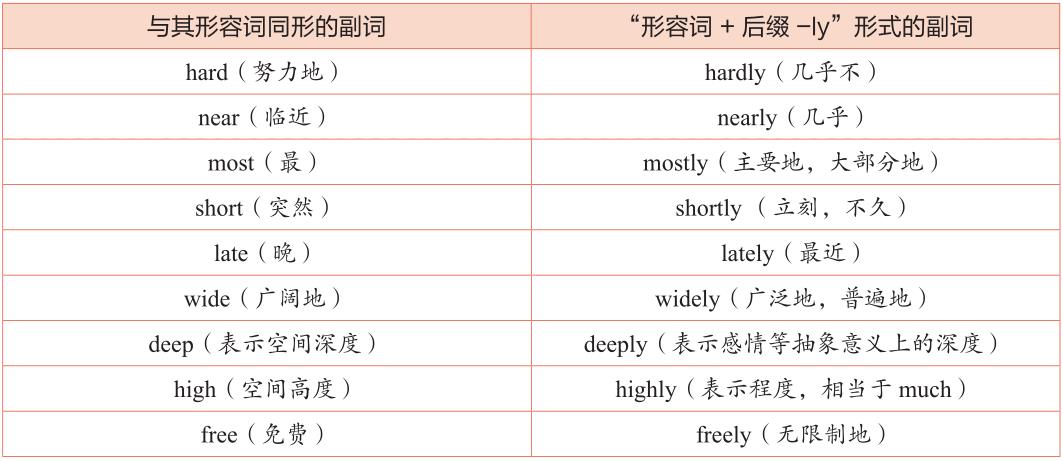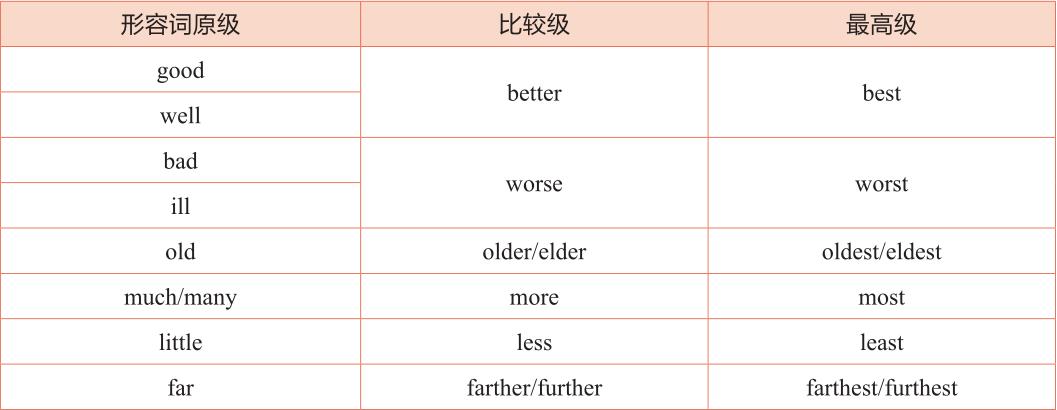




形容词用来修饰、说明名词及名词性成分,描绘人或事物的性质、特征和状态。副词用来修饰动词、形容词、副词或全句,表示时间、地点、方式、程度等意义。大部分形容词和副词都分原级、比较级和最高级三种形式。
形容词的使用比较复杂,可以将其基本用法归纳为作定语、作表语、作宾补三个方面。
形容词作定语时通常在其所修饰的名词性成分之前。当两个以上形容词共同修饰这个名词时,它们的先后顺序通常遵循如下公式:
限定词→主观描绘性形容词→表大小、长短、形状、新旧、颜色的形容词→表地点的形容词→表材料的形容词(也可由名词充当,如stone、brick、steel)+ 被修饰的名词。
以上公式中的限定词是指表示数量关系、所属关系或者指示关系的词汇,它们可按先后顺序分为三个层次:①all、half、both等不定代词或者分数、倍数;②冠词、指示代词、物主代词或名词所有格;③数词(其中序数词在前、基数词在后)。
试记忆如下例子: the man ' s first two interesting little red French oil paintings 这个人最初拥有的两张有趣的、小幅的、红色的法国油画 // a nice long new black British plastic pen 一支好的、长长的、新的、黑色的英国塑料钢笔。 如果几个形容词的性质相似,一般音节少的形容词在前,音节多的在后,例如: It was a rainy, windy, depressing day. 这是下雨的、刮风的、阴沉的一天。
语法考点运用实例·典型单选题>>
【例1】 Mothers holding jobs outside the home should have______schedules to make it easier to care for their children.
A. heavy B. smooth C. flexible D. complex
【答案】 C
【解析】 题干句意为:在外工作的妈妈们应该有灵活的工作时间,以更方便照顾孩子。四个选项的基本含义分别是“沉重的”“光滑的”“灵活的”“复杂的”,其中flexible最符合整体的语境。
【例2】 I'm not surprised that he became a writer. Even as a child he had a______imagination.
A. clear B. cautious C. funny D. vivid
【答案】 D
【解析】 下划线处充当imagination的定语,填入四个选项中的形容词在语法上都不存在错误,但是跟前文“became a writer”相呼应的最佳选择是“vivid(生动的,逼真的)”。
大部分形容词既可以作定语,又可以作表语,形容词在系动词后作表语时说明主语的情况。注意:某些形容词既可作定语,又可作表语,但所表示的意义不同,例如:
My dog was playing with a live mouse. 我的狗在玩一只活老鼠。 (live作定语)
It wasn't a recorded show; it was live. 那不是转录节目,是实况转播。 (live作表语)
语法考点运用实例·典型单选题>>
【例1】 Be______—you can't expect me to finish all this work in so little time.
A. reasonable B. confident C. creative D. grateful
【答案】 A
【解析】 题干句意为:理智些吧——你不可能指望我在如此短的时间内完成所有的工作。四个选项都可以填入下划线处充当表语,分别意为“合理的,理智的”“自信的”“有创造性的”“感激的”,只有选项A符合题意。
【例2】 In that school, English is compulsory for all students, but French and Russian are______.
A. special B. regional C. optional D. original
【答案】 C
【解析】 题干中but前面的内容提到“在那所学校,英语是所有学生的必修课”,表示转折的but后面的内容应该是“法语和俄语属于选修课(不属于必修课)”。special的含义是“特别的,特殊的”;regional的含义是“地区的”;optional的含义是“可选择的”;original的含义是“最初的”,四个选项中C最符合题意。
【例3】 Interest is as______to learning as the ability to understand, even more so.
A. vital B. available C. specific D. similar
【答案】 A
【解析】 题干句意为:兴趣对于学习来说极其重要,就像理解能力对于学习极其重要一样,甚至可以说兴趣比理解能力还要重要。本题表面上考查形容词辨析,其实也在间接考查对同级比较句式的理解和把握。be vital to表示“对……极其重要”;be available to表示“可以得到(某物)”;specific 不能与to 搭配;similar to 表示“与……相似”,选项A最符合题意。
形容词可以在动词后作宾语的补语,对宾语加以修饰或说明,例如:They make me angry. 他们让我很生气。 如果宾语很长,形容词也可紧跟在动词之后、放于宾语之前,例如: Mother keeps clean the floor, the furniture and everything. 妈妈让地板、家具以及其他一切东西保持干净。// He set free all the prisoners in the village. 他把这个村子里的所有战俘都给放了。
语法考点运用实例·典型单选题>>
【例】 Computers and mobile phones, though they are indeed making our life______and more______, have reduced the need for face-to-face communication.
A. easily; efficient B. easy; efficient C. easy; efficiently D. easily; efficiently
【答案】 B
【解析】 题干句意为:尽管计算机和手机的确让我们的生活便利、更加高效,但是它们减少了面对面交流沟通的需要。两个下划线处都是making our life的宾补,都应采用形容词的形式,选项B为最佳答案。
高考中与情绪相关的一类形容词值得特别注意。我们可以把interesting(使人感兴趣的,令人好奇的)等形容词称为“激起情绪”的形容词,把interested(对……感兴趣的)等形容词称为“感到情绪”的形容词。“激起情绪”的形容词表示客观上“令人……的”,“感到情绪”的形容词表示主观上“感到……的”。很多辅导资料把“激起情绪”的形容词总结为-ing形容词,把“感到情绪”的形容词总结为-ed形容词,这是对考生的误导,虽然在高考中有些表“激起情绪”的形容词由-ing形式转化而来、以-ing结尾,有些表“感到情绪”的形容词由过去分词转化而来、以-ed结尾,但是也存在不少其他的形式,甚至有些形容词既可表示“激起情绪”,又可表示“感到情绪”,集两种意思于一身。下表对常考词汇进行了总结:

语法考点运用实例·典型单选题>>
【例】 Though______to see us, the professor gave us a warm welcome.
A. surprise B. was surprised C. surprised D. being surprised
【答案】 C
【解析】 题干的句子可以还原成:Though the professor was surprised to see us, he gave us a warm welcome.(当主句和从句的主语一致时,可以省略从句中的主语和be 动词)因此在下划线处直接填入表示主观上感到惊讶的形容词surprised最符合题意。
副词在句子中作状语,修饰动词、形容词、其他副词乃至整个句子。
例如:My mother has been working hard all morning. 我母亲辛辛苦苦地干了一上午的活。 (副词hard修饰动词)
My brother and I are quite different. 我兄弟和我很不一样。 (副词quite修饰形容词)
He runs very fast. 他跑得很快。 (副词very修饰副词)
Obviously, the television has both advantages and disadvantages. 显然,电视有优点,也有缺点。 (副词obviously修饰全句)
语法考点运用实例·典型单选题>>
【例1】 I've been writing this report______for the last two weeks, but it has to be handed in tomorrow.
A. finally B. immediately C. occasionally D. certainly
【答案】 C
【解析】 题干中前半句用的是现在完成进行时态,后面又提到“(报告)明天必须上交”,这表明报告还没有写完。四个选项的基本含义分别是“最终”“立刻”“偶尔(间或)”“当然”,其中选项C最贴合句意,充当writing的状语,表示“断断续续地写”。
【例2】 Running a company is not______a matter of hiring people —they also need to be trained.
A. simply B. partly C. seriously D. equally
【答案】 A
【解析】 simply指“仅仅,只不过”;partly指“部分地”;seriously指“严肃地,严重地”;equally指“平等地,相等地”,以上四个副词中simply最符合题意,题干句意是:经营一家公司不仅仅是雇人的事情——还需要对雇员进行培训。
【例3】 “Perhaps we need to send for Dr. Smith to see what we can do about it,”father suggested______to his neighbor who had come to discuss the problem.
A. tentatively B. thoughtlessly C. definitely D. rudely
【答案】 A
【解析】 题干句意为:“看来我们要请史密斯博士来看看我们对此能如何处理,”父亲向来讨论此问题的邻居试探性地建议道。A选项意为“试探性地”,符合语境;B选项意为“欠考虑地”;C选项意为“明确地”;D选项意为“粗鲁地”,都与语境不符。
高考中某些副词有两种形式,一种形式与其形容词形式同形,另一种形式是形容词带后缀-ly,在使用中要特别留意两者在意思上的差异。高考中常见的类似副词主要有以下几组:

请体会如下例句:
They tried hard to succeed. 他们努力工作以获得成功。
It was so dark that I could hardly see anything. 天那么黑,我几乎什么都看不见。
You have come too late. 你来得太晚了。
What have you been doing lately? 你近来在干些什么?
He pushed the stick deep into the mud. 他把棍子深深插入泥土中。
Father was deeply moved by the film. 父亲被这部电影深深感动了。
The plane was flying high. 飞机正在高飞。
I think highly of your opinion. 我尊重你的观点。
He opened the door wide. 他把门大开。
English is widely used in the world. 英语在全世界被广泛使用。
You can eat free in my restaurant whenever you like. 你可以随时来我的餐馆免费就餐。
You may speak freely; say what you like. 你可以畅所欲言。
【例4】 —Hi, Mark. How was the musical evening?
—Excellent! Alex and Andy performed______and they won the first prize.
A. skillfully B. commonly C. willingly D. nervously
【答案】 A
【解析】 skillfully指“巧妙地,技术好地”,commonly指“一般,普通,通常”,willingly指“愿意地,欣然地”,nervously指“紧张不安地”。题干中前一个说话者问音乐晚会怎么样,回答者的回答是“非常好”,我们可以由此推断亚历克斯和安迪应该是娴熟地(skillfully)完成了表演并获得第一名。
多数形容词、副词可以进行比较,形容词和副词的比较等级分为原级、比较级和最高级三种。
(1)单音节形容词比较级和最高级的规则形式:
①若无特殊情况,单音节形容词通常以加词尾-er和-est的方式分别构成其比较级和最高级。例如:tall—taller—tallest。
②以-e结尾的形容词,加词尾-r和-st,例如:large—larger—largest。
③以一个辅音字母结尾的闭音节单音节词,双写结尾的辅音字母,再加词尾-er和-est。例如:big—bigger—biggest;glad—gladder—gladdest。
④以“辅音字母 + y”结尾的单音节词,改y为i,再加词尾-er和-est。例如:icy—icier—iciest。
(2)双音节形容词或更多音节的形容词通常都在其前面分别加more、most构成比较级、最高级,例如:foolish—more foolish—most foolish;beautiful—more beautiful—most beautiful。
(1)单音节副词比较级和最高级的规则形式:若无特殊情况,单音节副词通常以加词尾-er和-est的方式分别构成其比较级和最高级。例如:low—lower—lowest;loud—louder—loudest。
(2)双音节及多音节副词,特别是以-ly结尾的副词,通常都在其前面分别加more、most构成比较级、最高级,例如:wisely—more wisely—most wisely;beautifully—more beautifully—most beautifully。但这个副词例外:early—earlier—earliest。
下表总结了高考中常见的形容词比较级和最高级的不规则变化:

高考中常见的副词比较级和最高级的不规则变化请参见下表:

语法考点运用实例·典型单选题>>
【例1】 —How was your recent trip to Sichuan?
—I've never had______one before.
A. a pleasant B. a more pleasant C. a most pleasant D. the most pleasant
【答案】 B
【解析】 第二句句意为:我从没有过比这次更快乐的旅行。言外之意是,这次四川之旅是最快乐的。not、never等否定词与比较级连用表达最高级意义,选项B最合乎题意。
【例2】 It is______to spend money on preventing illnesses by promoting healthy living rather than spending it trying to make people______after they are ill.
A. good; good B. well; better C. better; better D. better; good
【答案】 C
【解析】 题干中的It是形式主语,真正的主语是to spend引导的动词不定式短语。题干句意为:与其把钱花在让病人康复上,倒不如把钱花在通过促进健康的生活来预防疾病上。注意:题干中出现的rather than是固定短语,意为“与其(说)……,不如(说)……”。
【例3】 You're driving too fast. Can you drive______?
A. more slowly a bit B. slowly a bit more C. a bit more slowly D. slowly more a bit
【答案】 C
【解析】 题干句意为:你把车开得太快了,你能开慢点吗?slowly的比较级应在前面加more,而修饰比较级的a bit应被放在比较级的前面。注意:比较级之前可用a bit、a little、a lot、much、far、even等词修饰。
高考中对原级比较的表达方式的考查点为:as + 形容词或副词原级(+ 名词)+ as。该结构中的第一个as为副词,表示“同样地”;第二个as为连词,其后要接一个句子,但这个句子经常以省略形式出现。例如:He has done as much homework as you have. 他已经完成的作业跟你已经完成的作业一样多。 (第二个as后省去了跟前面一致的谓语部分的实义动词done,保留了助动词have)// It is as cold in Nanning as in Beijing. 南京和北京一样寒冷。 (第二个as后省去了跟前面一致的主语和谓语“it is”,只剩下地点状语“in Beijing”)
原级比较的否定形式是:“not as/so + 形容词或副词原级 + as”。例如: English is not so difficult as Latin. 英语没有拉丁语那么难。// He doesn ' t run as fast as he used to. 他没有原来跑得快了。
语法考点运用实例·典型单选题>>
【例1】 This training program can give you a lift at work,______increase your income by 40%.
A. as well as B. so long as C. so much as D. as soon as
【答案】 A
【解析】 题干句意为:这个培训计划除了可以提高你的收入40%之外,还能够让你在工作方面得到提升。同级比较形式的as well as常用来表示“除……之外(还有)”,最适合题意;B选项意为“只要”,C选项意为“与……一样多”,D选项意为“一……就”,均不符合题意。
【例2】 I have seldom seen my mother______pleased with my progress as she is now.
A. so B. very C. too D. rather
【答案】 A
【解析】 题干句意为:我很少看到妈妈像现在这样为我的进步如此开心。在否定句或表示否定意义的句中,表示“像……一样”的“as... as...”中的前一个as可以被so代替。
表示在两者中一方比另一方“更加……”,通常采用如下结构:形容词或副词的比较级 + than(连词than引出的句子中,与前面重复的部分经常被省略)。例如:The white collar workers usually earn more than the blue workers do. 白领工人一般比蓝领工人赚得多。 (than后的句子中省去了实义动词形式的谓语,以助动词代之)
There are more books in this library than in that library. 这个图书馆的书比那个图书馆的书多。 (than后省去了与前面一致的there are many books,保留了状语)
She is much better than yesterday. 她比昨天好多了。 (than后省去了与前面一致的主语和谓语she was,保留了状语)
如果意思明确,整个than引出的从句都可以被省略,例如:You should have come earlier(than you did). 你应该早点来。
注意:名词前的比较级通常不需要than引出的从句,例如:The elder students sometimes bullied the younger ones. 年龄大一些的学生有时欺负年龄比他们小的学生。
语法考点运用实例·典型单选题>>
【例1】 The result is not very important to us, but if we do win, then so much______.
A. the best B. best C. better D. the better
【答案】 D
【解析】 题干句意为:结果对我们来说并非那么重要,但是如果我们真的赢了,那就再好不过了。so much the better(那再好不过了)是常见的固定短语。
【例2】 Though he started late, Mr. Guo played the piano as well as, if______, Miss Liu.
A. not better than B. not better C. no better than D. no better
【答案】 A
【解析】 下划线处与if构成插入语,与前面表示原级比较的as well as共用同一个比较的对象——Miss Liu,因此下划线处应带上than,由此排除选项B、D;由于no better than表示的意思是“前后两者都不好”(例如: His study is no better than her. 他和她学习都不怎么好。 ),不符合题意,由此进一步排除C而选出A。注意:no better than还可以表示其他含义,其后面接名词时指“几乎等于”,例如: He is no better than a beggar. 他简直是个乞丐。
表示在三个(或三个以上的)人或事物中的最高程度,其通用结构是:the + 形容词或副词的最高级 + 比较范围。
形容词最高级与副词最高级之间的重要区别在于:形容词最高级前通常要加定冠词the,副词最高级前一般不加the。例如: China has the largest population in the world. 中国是世界上人口最多的国家。 // Mr. White works hardest in the company. 怀特先生在公司里工作最努力。
注意:如果形容词最高级前有不定冠词、物主代词等其他限定词,也不需加定冠词,例如: Tuesday is our busiest day. 周二是我们最忙的日子。
语法考点运用实例·典型单选题>>
【例】 Alan is a careful driver, but he drives______of my friends.
A. more carefully B. the most carefully C. less carefully D. the least carefully
【答案】 D
【解析】 下划线后面表示范围的“of my friends”表明下划线处应采用最高级形式,考生可以先排除选项A、C;由于下划线处之前有but表示转折,故下划线处应表示“最不小心地”而不是“最小心地”,考生可以进一步排除B而选出D。
本章补充强化训练题>>
1. Look! There are lots of______birds flying over the trees.
A. funny red little B. funny little red C. little funny red D. little red funny
2. The football match was televised______from the People's Stadium.
A. lively B. living C. live D. alive
3. Reading without stop is a______piece of work.
A. tire B. tired C. tiresome D. troubled
4. The______look on her face suggested that she______angry.
A. surprising; was B. surprising; is C. surprised; was D. surprising; should be
5. Please pay______attention to your spelling while you are writing.
A. suitable B. special C. low D. closely
6. —Thank you very much.
—You are welcome. I was______glad to help.
A. too much B. only too C. not so D. very much
7. Please don't let the boy who is______go and do anything for you.
A. not strong enough B. not strong enough to C. so weak as to D. too weak to
8. She said her interest______lay in collecting stamps.
A. mostly B. mainly C. most D. best
9. It's______a cold day. It's______impossible for the children to go out to play.
A. very; very B. rather; quite C. such; rather D. too; quite
10. She felt very angry about the traffic accident, looking______at the rude driver.
A. worried B. happily C. coldly D. excited
11. —My mathematics is very poor.
—Don't worry. I'll help you______I can.
A. as far as B. as soon as C. as quickly as D. as possible as
12. —It's six o'clock and your father is still at the office.
—I know. Who else would______he does?
A. be as hard-working as B. be working harder than C. do harder work than D. work as hard as
13. Growing corn doesn't need______growing rice.
A. as much water as B. as much water like C. much water as D. too much water as
14. This kind of paper was as soft and light as silk but______expensive.
A. much less B. much little C. many less D. much more than
15. The higher the birds flew,______we could see them.
A. less clearly B. the less clearly C. more clear D. more clearly
16. Betty's English is______than______in the class.
A. much better; anyone else B. far better; anyone else's C. a lot better; anyone's else D. a great deal better; anyone's else's
17. —What do you think of Mr. Wang's teaching?
—Oh, no one else teaches______.
A. better B. well C. best D. the best
18. I won't love you______even if you fail in the coming exam.
A. any more B. any less C. no more D. no less
本章补充强化训练题参考答案>>
1. B 2. C 3. C 4. C 5. B 6. B 7. A 8. B 9. C 10. C 11. A 12. D 13. A 14. A 15. B 16. B 17. A 18. B